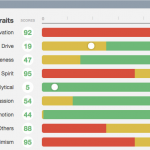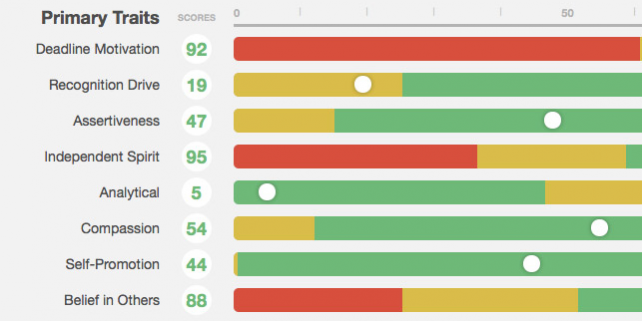This is a very simple, easy-to-understand primer on sales assessments.
For starters, you may have read the three posts I wrote about choosing pre-hire sales assessments. If you haven’t, here they are:
- What Outcome Do You Want from a Sales-Hire Assessment?
- Sales-Hire Assessments – Part 2: Why SALES is Hard to Hire for
- Press for the Sales-hiring Outcome you NEED — Part 3
In these three previous posts, we looked closely at why sales-hiring assessments must be different than general hiring assessments in order to find sales performers who can succeed and help you succeed. In a word, SALES is a different kind of role and requires special qualifications, which can be tested for.
Let’s look at sales-hiring assessments in general, and talk about some of the differences in them.
EASY —VS — HARD
As recruiters know, some application processes are pretty quick (for the candidate) and some more lengthy. Some assessments are easy to take, and some take real work to get through. (Remember, they also serve as a work sample.)
For instance, there are assessments that promise the candidate only needs “six minutes” or maybe 15 minutes, to complete the survey. With candidates often scarce, there is great pressure to make the application and testing as easy as possible, for fear of running applicants off. But is this in the company’s best interest? Is it even in the candidate’s best interest?
Good predictability of success for a sales candidate does require time and some expense. But it is far cheaper than the cost of turnover and making bad sales hires. Dr. Jordan Peterson talks about a strange “inverse rule,” where many companies use much less predictive assessments because they are cheaper and they do not get complaints about the process taking a lot of candidate time. He claims: “…the probability that a company will use a [particular] test is inversely related to the accuracy of the test.” The result is, of course, more sales failures.
HIGH PREDICTIVE VALIDITY —VS — NOT-SO-HIGH PREDICTIVE VALIDITY
How accurate is the sales assessment you are using? With the better assessments, scientific, statistical validation studies have been done, comparing your sales roles with successful/moderately successful/unsuccessful employees in similar roles who have recorded their scores on the same tests answering the same questions. (We can do this this study within a single company — if they have >100 salespeople who take the test and provide us with various data about performance.) We also have good statistical studies that group similar sales roles in certain industries, which is especially helpful to smaller companies.
But there are many assessments out there where little or no study has been done, and it is more “guesswork.” At best, some may claim to have validated their tests against the general population, not even focusing on sales, but on everything.
Other assessments state that their results “correlate” with other tests that are proven to be accurate historically. What that means is that a wide audience of candidates across the country who tested with XYZ – scores in another test and who proved to be good hires, also tested with ABC scores on this particular test — and thus you assume the ABC candidates are also well-suited for the job because this test “correlates” to the other test. The other test may have done much better scientific analysis, and, in a sense, this test piggy-backs on the statistical work of the other one.
Psychologists do correlation studies like this all the time, and there is a certain kind of “validity” that comes with it, at a much cheaper price. On the positive side, it is a great error-checking device to make sure that your test outcomes are not too far off base. On the negative side, a test that does not DIRECTLY validate against the measured results in the company (or at least of the industry that you are validating it for) is making its predictions through a filter and second-hand information. You are correlating your test against the results of someone else’s test
SALES-SPECIFIC TRAITS — WITH BENCHMARKED REPORTS — VS — GENERALIZED TRAITS
 As I have pointed out, few pre-hire assessments out there are designed solely for sales hiring. Thus, they measure a wide variety of “traits,” and then try to derive some sales-predictive reports from the scores. Usually, the trait clusters come from widely-used platforms such as those found in the DiSC or “The Big Five.”
As I have pointed out, few pre-hire assessments out there are designed solely for sales hiring. Thus, they measure a wide variety of “traits,” and then try to derive some sales-predictive reports from the scores. Usually, the trait clusters come from widely-used platforms such as those found in the DiSC or “The Big Five.”
Our assessment, the CTS Sales Profile, has been developed to test specific traits in personality and behavior that relate specifically to the sales position. It has been developed and refined over decades to highlight areas we know by sales training experience to be very important for success. In addition, the results from the test audience are benchmarked against your candidate’s trait scores with green, yellow and red shading for easy analysis.
STATEMENT-BASED QUESTIONS VS. ADJECTIVE-LIST-CHOICE QUESTIONS
Some of the popular pre-hire assessments do not give questions that are indicative of actual workplace behavior choices. They use a popular social psychology method (that has been criticized within the profession) which uses what is called “the lexical hypothesis.” This system is more tuned towards “self-reporting” of intent by choosing from a list of adjectives that you feel describe yourself. Industrial psychology professionals who criticize this method believe that an assessment with more “behavioral” and “statement-based” questions is far better and more trustworthy — AND it is more in line with the long history of business psychology testing.
FAKE-PROOF vs. EASY-TO-FAKE
Sales candidates are sometimes very good at “selling” the company’s recruiters, and not so good at actual prospecting and sales work. They are often good at giving answers on the assessment that project an image of capabilities they do not really have. They know how to “give you what you want to hear.” Our assessment, created with the help of Dr. Larry Craft, an expert on ‘anti-fakeability’ in pre-employment testing, is excellent at pointing out when the answers seem suspicious and not trustworthy. We give RELIABILITY and DISTORTION scores with our reports.
TEAM and COACHING REPORTS
Sales coaching is a unique process and differs from coaching other teams in the workplace. An assessment created around the sales rep and sales leader roles and centered on these jobs, as ours is, creates a natural foundation for very robust, individualized coaching reports, which we also deliver.
Our CTS Sales Profile is a high-quality, scientifically-predictive sales-hiring assessment. Check it out!

